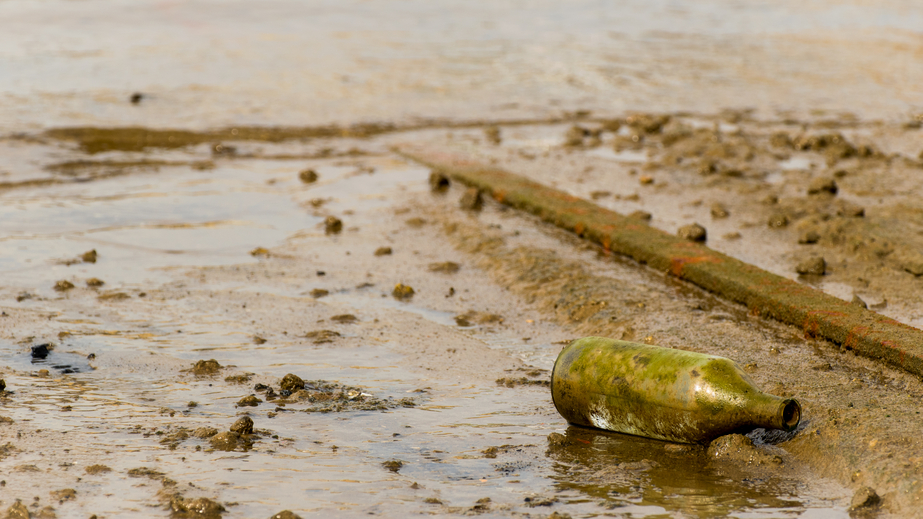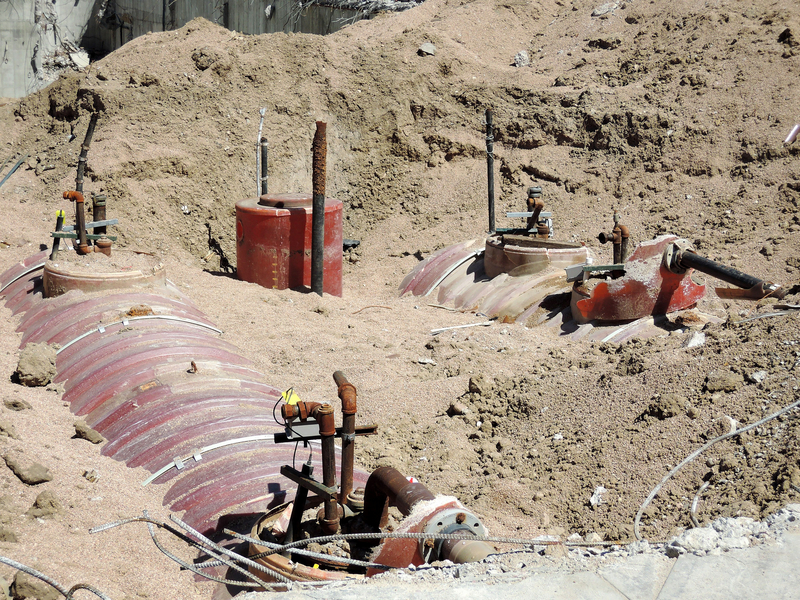Delaware Environmental and Ethics 24 PDH Discount Package 1
Natural Attenuation of the Lead Scavengers EDB and 1,2-DCA (C04-047)
Release Detection for Underground Storage Tanks and Piping (C04-050)
Revitalizing Contaminated Lands: Addressing Liability Concerns (C03-061)
Engineering Ethics for Delaware Professional Engineers (DE2-001)

This online engineering PDH course establishes criteria and guidance for landfill gas (LFG) collection and treatment systems. In addition, this course provides information about the design of systems used to monitor, collect, transport, and treat gas from municipal, industrial, and hazardous waste landfills.
LFG is produced by the biological decomposition of general solid waste refuse and other organic materials disposed of in the landfill. Its production typically begins within a year of waste placement, and may continue up to 50 years after landfill closure, with peak LFG production for any given disposal cell occurring within the first or second year of waste placement. The total LFG production rate increases as more waste is added to the landfill.
This course aims to provide information specifically relating to landfill gas collection systems in order to help landfill employees understand the available equipment and how and when to use them.
This 11 PDH online course is applicable to civil, environmental, geotechnical engineers, construction managers and landfill operators seeking an introduction to the operation and maintenance of landfill gas collection systems.
This PE continuing education course is intended to provide you with the following specific knowledge and skills:
- Understanding the purpose of landfill gas collection systems
- Learning how to design landfill gas collection systems
- Learning how to design landfill gas treatment systems
- Familiarizing with the operation and maintenance of landfill gas collection systems
- Familiarizing with the safety procedures and regulations of landfill gas collection systems
Upon successful completion of the quiz, print your Certificate of Completion instantly. (Note: if you are paying by check or money order, you will be able to print it after we receive your payment.) For your convenience, we will also email it to you. Please note that you can log in to your account at any time to access and print your Certificate of Completion.

This online engineering PDH course reviews the current knowledge of the transport and fate of EDB and 1,2-DCA in ground water. It also provides information on the distribution of EDB and 1,2-DCA at motor fuel release sites that was collected during a survey of sites coordinated by the U. S. EPA Office of Underground Storage Tanks and the Association of State and Territorial Solid Waste Management Officials (ASTSWMO) and evaluates the associated chance of contaminating ground water.
Lead was effectively banned in gasoline in the USA before the underground storage tank program was fully implemented. As a result, only a portion of the state agencies that implement the federal UST program routinely monitor for EDB and 1,2-DCA at gasoline spill sites. In many states, little is known of the risk from EDB and 1,2-DCA at old leaded gasoline spill sites. Monitored Natural Attenuation (MNA) is widely used by State Agencies to manage the risk from other fuel components, such as benzene, in ground water. The appropriate application of MNA requires a solid understanding of the behavior of the contaminants in ground water.
This 4 PDH online course is applicable to all civil, environmental or chemical engineers, as well technical personnel who conduct risk evaluations for EDB or 1,2-DCA at specific motor fuel release sites, and for the technical staff of regulatory agencies that review the risk evaluations and make decisions concerning risk management and cleanup of the contamination. It is also useful for those who must apportion resources for monitoring and risk management of the hazard associated with EDB, benzene, and 1,2 DCA in ground water used for drinking water.
This PE continuing education course is intended to provide you with the following specific knowledge and skills:
- Understanding the use of EDB and 1,2-DCA in leaded motor fuel
- Familiarizing with the regulation of motor fuel storage to protect ground water and drinking water
- Learning about investigations of EDB and 1,2-DCA at motor fuel release sites
- Familiarizing with the conceptual model of a motor fuel release in the subsurface
- Learning about attenuation caused by physical processes
- Learning about attenuation caused by abiotic transformation or biodegradation
- Applications of Compound Specific Isotope Analysis (CSIA) to document biodegradation and/or abiotic transformation of EDB and 1,2-DCA
- Understanding the distribution of EDB and 1,2-DCA at motor fuel release sites, and the associated chance of contaminating ground water
Upon successful completion of the quiz, print your Certificate of Completion instantly. (Note: if you are paying by check or money order, you will be able to print it after we receive your payment.) For your convenience, we will also email it to you. Please note that you can log in to your account at any time to access and print your Certificate of Completion.

This online engineering PDH course presents information about the 2015 federal underground storage tank (UST) system requirements and regulations. UST and its underground piping must have release detection to comply with federal law. In addition to complying with federal law, some implementing agencies may have additional regulations which apply to the system.
Each of the sections herein focus on one release detection method for underground tanks and/or the requirements for underground piping. You will find answers in this booklet to basic questions about how release detection methods work and which methods are best for your UST site.
As of September 2015, over 528,000 UST releases were confirmed since the UST program was implemented. At sites without release detection, contamination can spread undetected, requiring difficult and costly clean-ups.
If you have effective release detection, you can respond quickly to signs of releases. You can minimize the extent of or eliminate potential for environmental damage and the threat to human health and safety. Early action also protects you from high costs that can result from cleaning up extensive releases and responding to third-party liability claims.
This 4 PDH online course is applicable to petroleum engineers, owners/operators, and personnel involved with the release detection of underground storage tanks.
This PE continuing education course is intended to provide you with the following specific knowledge and skills:
- Learning the basic release detection requirements for underground storage tanks (USTs) and piping
- Understanding the different release detection methods for USTs and choosing the best option for a given application
- Familiarizing with the federal regulatory requirements for release detection
Upon successful completion of the quiz, print your Certificate of Completion instantly. (Note: if you are paying by check or money order, you will be able to print it after we receive your payment.) For your convenience, we will also email it to you. Please note that you can log in to your account at any time to access and print your Certificate of Completion.

This online engineering PDH course discusses the statutory, policy, guidance, and regulatory provisions that may be helpful to parties looking to manage environmental clean-up liability risks associated with the revitalization of contaminated sites. It is designed for use by parties involved in the assessment, clean-up, and revitalization of sites, and provides a basic description of the tools that may be available to address liability concerns.
Revitalizing contaminated lands means providing reuse opportunities of abandoned properties to communities and land owners by cleanup enforcement program. The main objective of the cleanup enforcement program is to ensure prompt site cleanup and the participation of liable parties in performing and paying for cleanups in a manner that ensures protection of human health and the environment.
This 3 PDH online course is applicable environmental, civil, and industrial engineers as well as others interested in learning more about revitalizing contaminated lands.
This PE continuing education course is intended to provide you with the following specific knowledge and skills:
- Learning the enforcement tools to help promote the clean-up and revitalization of contaminated sites
- Understanding the policies available to help promote cleanup and revitalization of contaminated sites
- Knowing how to manage the environmental cleanup liability risks associated with the revitalization of contaminated sites for parties
- Familiarizing with the available tools to address liability concerns
Upon successful completion of the quiz, print your Certificate of Completion instantly. (Note: if you are paying by check or money order, you will be able to print it after we receive your payment.) For your convenience, we will also email it to you. Please note that you can log in to your account at any time to access and print your Certificate of Completion.

This online engineering PDH course presents the laws of professional responsibility governing the practice of engineering in the State of Delaware, as well as the Delaware engineering code of ethics as follows:
- Delaware Professional Engineers' Act: Title 24, Chapter 28
- Delaware Engineering Code of Ethics
Engineering ethics is (1) the study of moral issues and decisions confronting individuals and organizations involved in engineering and (2) the study of related questions about moral conduct, character, ideals and relationships of peoples and organizations involved in technological development (Martin and Schinzinger, Ethics in Engineering).
This 2 PDH online course is applicable to Professional Engineers licensed in the State of Delaware and who are required to demonstrate continuing professional competency in engineering ethics as a condition of their license renewal.
Every licensee is required to obtain the equivalent of 12 PDHs per year (or 24 PDHs obtained anytime during the renewal period). Of the 24 PDHs earned during the biennial renewal period: no less than 2 PDH and no more than 6 PDH shall be related to professional ethics, and no more than 9 PDH shall be related to business or project management. The balance shall be related to the licensee’s area of technical practice.
This PE continuing education course is intended to provide you with the following specific knowledge and skills:
- Understanding the statutory laws regulating the practice of engineering in the State of Delaware and their application to professional engineers
- Understanding the Delaware Engineering Code of Ethics promulgated by the Council of the DAPE to safeguard life, health and property and promote public welfare
- Learning about the engineering rules of professional responsibility and ethical conduct as well as understanding the basic obligations of the engineer
- Understanding the Delaware disciplinary process and the range of violations and corresponding penalties imposed by DAPE
Upon successful completion of the quiz, print your Certificate of Completion instantly. (Note: if you are paying by check or money order, you will be able to print it after we receive your payment.) For your convenience, we will also email it to you. Please note that you can log in to your account at any time to access and print your Certificate of Completion.